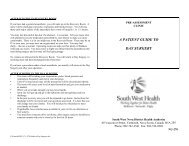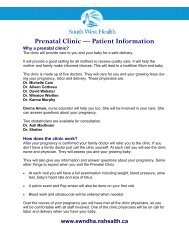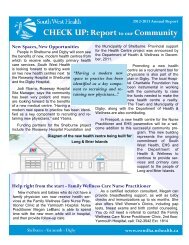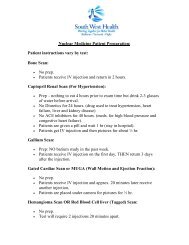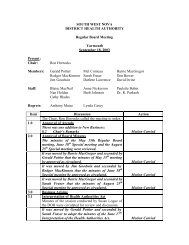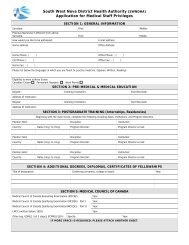Breastfeeding basics Breastfeeding basics - South West Health
Breastfeeding basics Breastfeeding basics - South West Health
Breastfeeding basics Breastfeeding basics - South West Health
Create successful ePaper yourself
Turn your PDF publications into a flip-book with our unique Google optimized e-Paper software.
28 B REASTFEEDING B ASICS<br />
If your baby is asleep at the breast, you can try<br />
a special squirting technique called breast<br />
compression. Hold your breast with one hand<br />
well back from the nipple and squeeze firmly,<br />
but gently. Continue squeezing until she stops<br />
swallowing, then release and try again. This will<br />
keep your milk flowing and baby’s interest up.<br />
A public health nurse or lactation consultant<br />
can help you learn this technique.<br />
If baby spits up<br />
Babies may spit up small amounts of breast<br />
milk after feeding. It is usually not a cause for<br />
concern. Breastfed babies tend to spit up less<br />
than bottlefed babies. Most babies outgrow<br />
spitting up within four to six months. Talk with<br />
your public health nurse or doctor if you are<br />
concerned about the amount your baby spits up<br />
or if your baby is not gaining weight.<br />
If baby’s needs seem to change<br />
You may find that you get a breastfeeding<br />
routine well established and then things<br />
change. Your baby wants to breastfeed more<br />
often. Baby is having a growth spurt, which<br />
is normal. You may notice this at 10 days,<br />
3 weeks, 6 weeks, 3 months, and 6 months,<br />
but each baby is different. You will know that<br />
your baby is having a growth spurt if he or she<br />
wants to feed more often than usual.<br />
G ETTING OFF TO A G OOD S TART 29<br />
During these growth spurts, you need to<br />
breastfeed as often as baby wants. But get some<br />
extra rest yourself. Your milk supply will rise to<br />
meet the greater demand in a day or two.<br />
You produce milk because the baby’s sucking<br />
causes your body to release the hormone<br />
prolactin. Prolactin is responsible for giving the<br />
signal to your breasts to make milk. Your<br />
prolactin levels are highest at night. Therefore,<br />
if you are trying to increase your milk supply,<br />
be sure to feed your baby often at night.<br />
Some women take their babies to bed with<br />
them. This allows them to get more sleep<br />
ibetween feedings.<br />
“I started to feel overwhelmed at one point, because<br />
I seemed to do nothing but breastfeed. But I kept at it.<br />
Now, breastfeeding is so natural to us both that I wonder<br />
what all the fuss was about. It’s our special time together.<br />
I also love that I can comfort her quickly whenever she gets<br />
a boo-boo.” a nursing mother


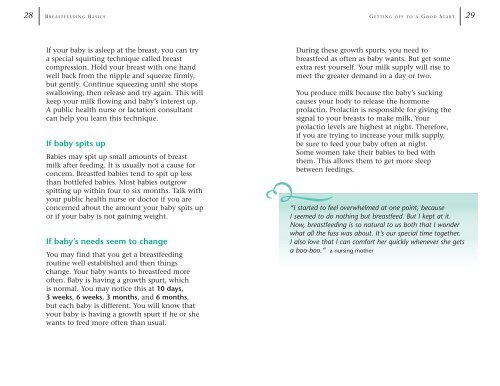
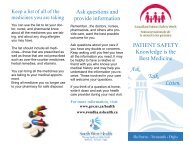
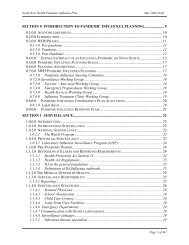
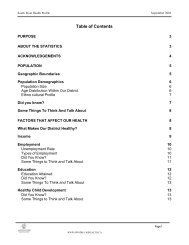
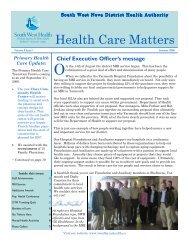
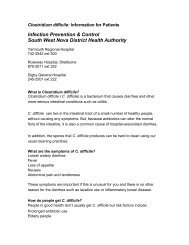
![Pressure Ulcer Prevention SWH[1].pub - South West Health](https://img.yumpu.com/26992883/1/190x115/pressure-ulcer-prevention-swh1pub-south-west-health.jpg?quality=85)
